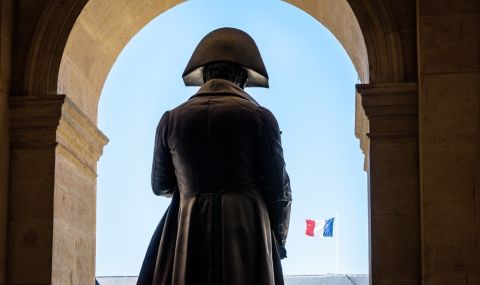Waterloo really put an end to Napoleon Bonaparte's career. In encyclopedias you will read that on June 18, 1815, near the Belgian village of Waterloo, the last major battle fought by Napoleon took place.
Waterloo was reached after Napoleon escaped from his exile on the island of Elba in February 1815 and returned to France. The period known as the “Hundred Days” began. The former emperor dethroned the restored Louis XVIII, gathered a huge army and headed for Belgium to stop the advance of the armies of the “Seventh Coalition” – an association between European monarchical dynasties, aiming to end French dominance in Europe, recalls the website In Brief.
Although Napoleon had an army of about 190-200,000, he was opposed by the armies of the alliance between Great Britain, Prussia, the Netherlands, the Kingdom of Hanover, the Duchy of Nassau and the Duchy of Brunswick-Lüneburg. The number of troops that the alliance could field against the French was estimated at 500-750,000 people, and with the announced mobilization it could reach a million. Therefore, Bonaparte decided to act and defeat the armies of the allies separately before they could unite. On June 13, the French army entered Belgium. Three days later, the French defeated the Prussian army, led by Field Marshal Blücher. Napoleon ordered Marshal Grouchy to pursue the retreating Prussians, and he himself led a 72,000-strong army against the forces of the Anglo-Dutch corps, commanded by Field Marshal Arthur Wellesley, Duke of Wellington.
The two armies met on the battlefield on June 18, 1815. In fact, the Battle of Waterloo did not take place near Waterloo. The town, which is immortalized in history, is located about 20 kilometers from Brussels and the Duke of Wellington's headquarters was located there on the night before the battle. He had a habit of naming the battles he fought after the place where he spent the night the day before the battle, which is why the battle went down in history as the Battle of Waterloo. The actual fighting took place near the village of Mont Saint Jean. The Anglo-Dutch forces occupied the heights of the Mont Saint-Germain plateau, which gave them a certain advantage.
Napoleon relied heavily on his artillery. He himself was an artilleryman and was very good at using the power of artillery fire. His plans were to use the advantages of his heavy cavalry in addition to the powerful artillery. But unfortunately, it rained the night before. This confused the Frenchman's plans. The battle began not at dawn, as was customary at the time, but almost at noon. Napoleon probably waited for the ground to dry out a bit so that he could maneuver with his artillery and heavy cavalry. And the wait may have been due to the fact that Napoleon was having a stomach crisis. Because of the painkillers that the doctors gave him, it is said that he spent almost the entire battle dozing. These were the remedies - opium was mainly used for pain relief.
The first attack hit the flank of the English. Napoleon wanted to draw the forces away from the center of the English. Until 4 p.m., the battle was evenly fought and the English managed to repel all French attacks. At that hour, however, Napoleon's heavy cavalry attacked the formations of regimental carriages of the British troops in the center of the battle. Followed by the elite Guards infantry, the French were about to break through the center. They found resistance to the attack in the British Guards ranks. An hour later, the denouement of the entire battle began.
Marshal Gruchy, who had been sent earlier to pursue the retreating Prussian army, turned out to be too cautious. Field Marshal Blücher, on the other hand, was a very stable tactician and managed to quickly and without major losses mislead Gruchy's pursuing corps. Thus, at about 3 p.m., the 30,000-strong Prussian army appeared on the right flank of the French.
A little later, the French troops captured the La Es Sainte farmstead, which was located in the center of the English positions. A new attack by the Guard was being prepared. The battle was at its turning point. The English managed to repel the fierce attack of the best military unit of the French army - the Old Guard. At the same time, Blücher broke through the French lines from the flank. The French began to retreat. At about 10 p.m., the two commanders-in-chief - the Duke of Wellington and Field Marshal Blücher met, and this marked the victory of the Allied forces over Napoleon's army.
Four days later, in Paris, Napoleon again abdicated the throne. After weeks of aimless wandering, the former emperor realized the hopeless situation he was in and surrendered to the British. After negotiations, the defeated French dictator was exiled to the island of St. Helena, where he spent the rest of his days until May 5, 1821.
